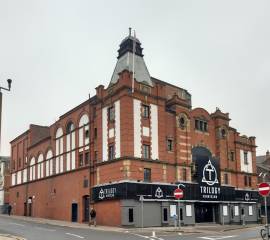What price independents?
Among several recent reports trumpeting the growth of small brewers there lies one vexing question: what is the next step to ensure this trend will continue and positively impact on the declining beer market?
The Intelligent Choice, a report funded by the Campaign for Real Ale (CAMRA) and Cask Marque among others and published in September, collated data from the Society of Independent Brewers (SIBA) and Nielsen to show that while the beer market declined seven per cent in 2007, SIBA members' (most of whom are microbrewers) sales grew 10 per cent.
Talk to SIBA and it certainly believes that the next step to helping turn around the beer market's declining volumes is to follow the local path. At its annual conference in March, chief executive Julian Grocock said: "The success of this organisation shows that local and microbrewers are no longer the oddballs on the side of a flat earth. We are at the heart of the industry."
And it is trying to hard to get large pub companies to buy into this ethos through its Direct Delivery Scheme (DDS). DDS involves a roster of locally produced cask beers being made available to tied lessees within pub companies. Both Enterprise Inns and Admiral Taverns, for example, allow their licensees access to the scheme. And it has worked - DDS has been instrumental in helping small brewers have the kind of success outlined in the Intelligent Choice report.
However, it has emerged that the conditions of the DDS are actually deterring some would-be champions of local beer from selling brews produced on their doorstep.
Some microbrewers looking to take on their own pubs have told The Publican that where they have acquired tied leases with access to DDS, prices have led those pubs to revert to cheaper nationally distributed ales.
A twist in the tie
In a bizarre twist, these brewers are asked to buy their own beer for their own pubs through the DDS at inflated prices. As a result, a brewer such as Wiltshire-based Moles is electing not to sell in its pubs the very beer its brewery produces down the road. Moles Brewery operates a number of pubs on Enterprise leases, and it would love to be selling local beer, but is instead selling national brands.
Is this an injustice or just the economic realities of the beer tie? Certainly, as far as SIBA's mission to promote local beers goes, this is not an ideal situation. One way to ensure local beers' strength continues to grow is for local brewers to achieve vertical integration. Operating their own pubs should ensure the supply chain is there for them. Sadly, this does not happen in these cases as they are paying more for their own beers than a freehouse would.
Could SIBA afford to make its prices more competitive? Accounts vary as to how prices of DDS beers compare to those for mainstream brands. Nick Stafford, managing director of the DDS, says that a barrel of beer sells through DDS for around £20 more than a brewer would sell it direct to freetrade. Some Enterprise lessees report that a barrel of DDS beer is cheaper to them than most national brands (see case study, opposite).
While Enterprise head of sales and marketing John Coe says that DDS prices will be standard for every lessee, some lessees, who wish to remain anonymous, report that in their cases the DDS beers are more expensive.
And many brewers with their own pubs say the same thing. Alan Morgan, managing director of Bath brewer and pubco Abbey Ales, managed to negotiate to be free of tie on an Enterprise lease. Otherwise, he says, the pub would not sell Abbey products obtained through DDS.
"I don't want to bite the hand that feeds me," Alan explains, "because I could not survive without the distribution the DDS gives my beers. But it would be nicer if it was more competitively priced. Where the scheme falls down is if people start comparing the prices to those available to freetrade."
Another brewing source, who wished to remain anonymous, says of the DDS: "I don't understand why any licensee would buy small independent beers at those prices, because they can't make their margin on them."
Have your cake and eat it?
However, Stafford claims the DDS prices are justified, that this level of pricing has to be accepted as a fact of life for tied lessees. "DDS prices are as competitive as they can be to the pubcos and to the brewers," he says.
"Price, of course, comes into it for a lessee, that's a simple economic fact. But it's the pubcos that own the bricks and mortar and set the terms of the rent. If a lessee wants to have beer at market value, they have to buy the pub or pay a proper commercial rent.
"Any brewer or pubco whingeing about this situation should own their own pubs - they don't understand economic reality. Big pubcos have to live in the economic reality, as should smaller brewers."
Coe agrees. He says: "It would be unfair to pick out a small brewer that happens to have some of our leases, and treat them differently from the rest of our retailers. These guys in this context are a retailer. But, on the other hand, SIBA is set up to allow those brewers access to distribution they would not otherwise have."
A case of having their cake and eating it, it would seem. As for SIBA itself, Stafford is unequivocal about the next stage for local beer. His answer to the question is "getting commitment from more pub owners".
"We have to convince them it's time to open the door," he adds. "Licensees are on the scrapheap if they can't pay the rent. Why is it so difficult for pubco execs to see that these beers could bring more customers in and help them to do that?"













